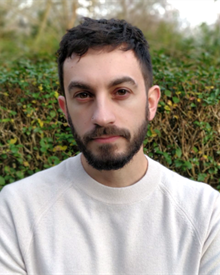Athanasios Georgakas

I am a PhD research student at the Institute of Metabolism and Systems Research (IMSR). With the support of Tommy’s National Centre for Miscarriage Research I am studying the paternal role in early miscarriage. During my first year at the University of Birmingham, I participated in the LGBT Careers mentoring scheme as a mentee. This offered me a great opportunity to understand what the workplace environment is like at the University and have a smoother induction. I have also attended several events such as screenings and talks regarding LGBT issues.
I believe that it is important to increase the visibility of all minorities in all dimensions of our life and universities should be role models of inclusivity in our society. Initiatives such as the LGBT staff profiles could aim toward this direction providing examples, inspiration and confidence especially to new members of staff and students.
Both here, at the University of Birmingham, and also in my previous role as a laboratory practitioner at University College London Hospital, I was lucky to have very positive experiences with colleagues, while I never really experienced discrimination for being an openly gay young man in my working environment. However, I recognise that this is not always the case. Being openly LGBT in many other organisations, especially in the private sector and/or in smaller communities could be more challenging.
Personally, I believe that our sexual orientation is an integral part of our identity and thus it is very important to be open in our workplace where we often spend a big part of our daily lives. In addition, socialising with our colleagues we all discuss about our families, relationships and life outside the narrow working matters. Therefore, being open about our sexual orientation at work allows us to build better and honest relationships with our colleagues.
The University of Birmingham was among the 2017 Stonewall Top 100 employers and in my experience, provides an LGBT friendly environment to work and study. There are lots of activities and events concerning LGBT issues but for sure there is always room for improvement. For example, I would like to see the College of Medical and Dental Sciences in collaboration with the oSTEM Society organising a campaign, a conference or an exhibition in order to recognise the contribution of LGBT scientists and doctors in the broad fields of Medicine and Biology. Also, it would have been very nice to see an even better support and promotion of LGBT events and a higher attendance and participation also by non-LGBT people.
In conclusion, working or studying at the University of Birmingham provides a welcoming and friendly environment to realise our potential as LGBT individuals. The University of Birmingham LGBTQ Association, the Rainbow Network and societies such as the oSTEM are all in place to offer support and information to all newcomers. I would suggest to new LGBT members of staff and students to attend and participate in events and activities organised for them and to make use of all the opportunities that would be beneficial for both their professional and personal development.